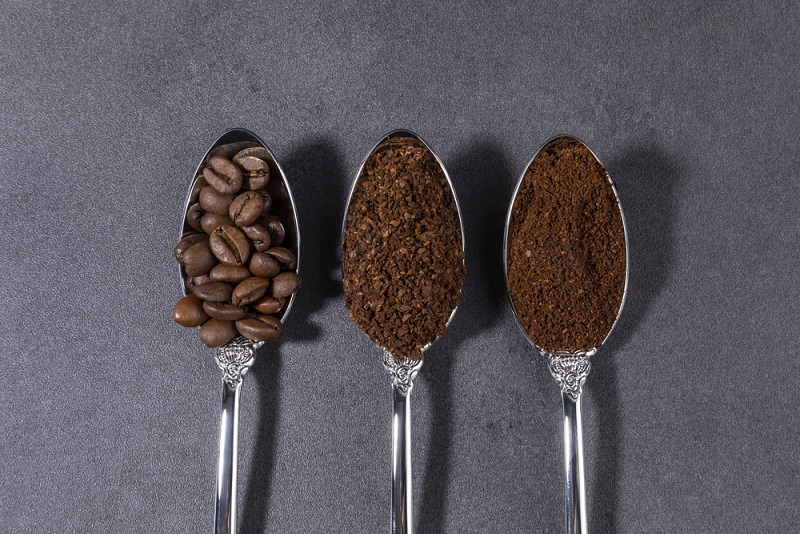
When we say “coffee”, most people imagine a steaming cup of classic, black Arabica. And although this association is not accidental, the world of coffee is much broader, more complex and full of alternatives. From beans to infusions from roots and grains, different types of coffee offer not only different flavors, but also properties. And it is these differences that are worth knowing before you throw another pack of ground “classic” into your basket. In this article, you will find answers to the question: what are the types of coffee.
What are the kinds of coffee? Overview of the most popular types of coffee
Types of coffee include not only the classic “little black”, but also a wide range of infusions that differ in taste, preparation method, caffeine content and health properties. The most common types of coffee are:
• espresso – an essential, small portion of coffee brewed under pressure, constituting a base for many other drinks,
• americano – espresso diluted with hot water, milder and less intense in taste,
• latte and cappuccino – milk versions of coffee, ideal for morning or dessert,
• cold brew – cold brewed coffee, refreshing, with lower acidity,
• cereal and chicory coffee – decaffeinated plant alternatives, good for children, pregnant women and people with hypertension,
• coffee with the addition of adaptogenic mushrooms (e.g. Reishi, Lion's Mane) – a functional drink supporting the nervous system and immunity. It is worth noting that the type of coffee affects not only the taste, but also the effect – some coffees stimulate, others support digestion, and still others help with concentration.
Different types of coffee – differences between classic coffees, plant coffees and functional alternatives
Different types of coffee are made in different ways – both in terms of the raw material and the processing method. The important differences are:
• what is coffee made of – classic coffees are made from coffee beans (Arabica, Robusta), while cereal, chicory or Jerusalem artichoke coffee come from root plants and grains,
• caffeine content – classic espresso has a high caffeine content, cereal does not contain it, and some mushroom coffees have only trace amounts,
• effect on the body – coffee with caffeine stimulates, cereal coffee calms the digestive system, and e.g. coffee with Reishi supports calmness and immunity,
• taste and aroma – classic coffee has a roasted, sour or chocolate profile; chicory and Jerusalem artichoke bring herbal, cereal notes, and coffee with mushrooms – earthy, nutty tones.
Thanks to this diversity, everyone can choose a coffee tailored to the time of day, lifestyle and current needs of the body. For a morning boost, classic Arabica will work, and in the evening it is worth reaching for an infusion of chicory with fig or cereal coffee with spelt.
Classic, or types of coffee beans – Arabica and Robusta
Let's move on to the basics – if you buy coffee beans or ground coffee, it will most often be Arabica, Robusta or a mixture of the two. Arabica (Coffea arabica) is the most valued variety of coffee beans – as much as 60-70% of world production is Arabica. It comes from Ethiopia, but today it is mainly grown in South and Central America. It is characterized by:
• lower caffeine content (approx. 1–1.5%),
• mild, slightly acidic taste,
• richness of notes – from nuts to fruit and chocolate.
For those looking for pure, organic Arabica, a great choice will be 100% Arabica BIO Alce Nero coffee beans – fair trade, without artificial additives, ideal for grinding at home. If you prefer a ready-to-brew version, ground Arabica with Robusta BIO Alce Nero will be a good option – balanced, strong, but not overwhelming.
Robusta (Coffea canephora) contains twice as much caffeine as Arabica. It gives a strong, bitter infusion – which is why it is often used as an additive in “espresso” blends. It is not available in 100% pure form among the most popular BIO products, but Arabica/Robusta blends offer great balance.
Decaffeinated and plant-based alternatives
Not all coffee contains caffeine. More and more people are choosing cereal, chicory, dandelion, Jerusalem artichoke, fig or functional mushroom coffees – for health, dietary or taste reasons. Roasted chicory is a classic in healthy cuisine. It has a characteristic, slightly nutty and herbal taste, has a beneficial effect on digestion and intestinal bacterial flora, and it does not contain caffeine.
Cereals are a classic in Polish homes. For people who avoid caffeine completely, cereals are a great base for a morning or evening ritual – you can drink them during pregnancy and for children. Functional coffees, which combine the taste of coffee with the adaptogenic properties of medicinal mushrooms, are gaining popularity.
Check also: Does green tea have caffeine?
Different types of coffee beans – how to choose the perfect one?
When choosing different types of coffee beans, it is worth paying attention not only to the type (Arabica or Robusta), but also to:
• origin – beans from Latin America are milder, from Africa – more fruity, and from Asia – earthy and heavier,
• degree of roasting – light roast gives more acidity, medium – balanced taste, and dark – bitter and chocolate notes,
• freshness of roasting – it is best to buy coffees roasted a maximum of 3–4 weeks before consumption,
• method of processing beans – natural processing gives more sweetness, and washed – a cleaner profile and greater acidity.
What are the different types of coffee and how to choose the best one for you?
Different types of coffee can be divided into classic (from coffee beans), alternative plant-based (from chicory, cereals, roots) and functional (with the addition of adaptogens). The choice depends on many factors.
1. Do you focus on caffeine? – choose Arabica or Robusta. Avoid them if you have hypertension – choose chicory or cereals,
2. What taste do you like? – light roasted coffee will give you acidity and freshness, dark roasted coffee will give you depth; cereals are mild and sweet,
3. Do you drink for your health? – Coffee with Reishi, dandelion, Jerusalem artichoke or Lion’s Mane can support specific body functions.
Thanks to the growing availability of organic and decaffeinated coffees, you can create your own set of coffees – tailored to the time of day, mood and health needs, and at the same time diverse and original. Arabica in the morning, coffee with fig.
What types of coffee are there? Summary
Coffee is not just Arabica and Robusta – the world of infusions also includes cereals, chicory, Jerusalem artichoke and Reishi. Beans differ in taste and properties – Arabica is mild, Robusta is strong, and cereals are delicate and decaffeinated. The type of roast (light, medium, dark) affects the acidity and intensity of the infusion. Products such as chicory coffee or coffee with the addition of adaptogenic mushrooms offer functional properties.
Learn more from our blog:
• How to make mint tea? What is it good for?

